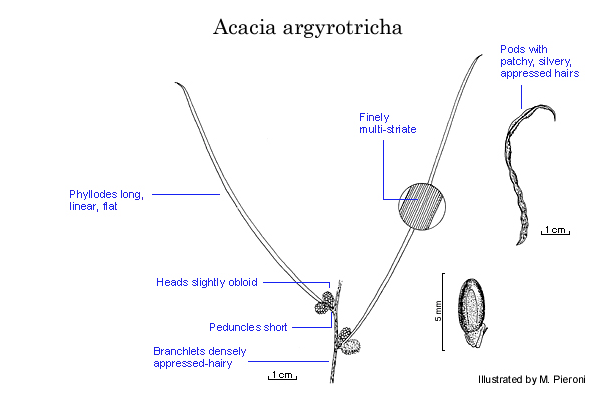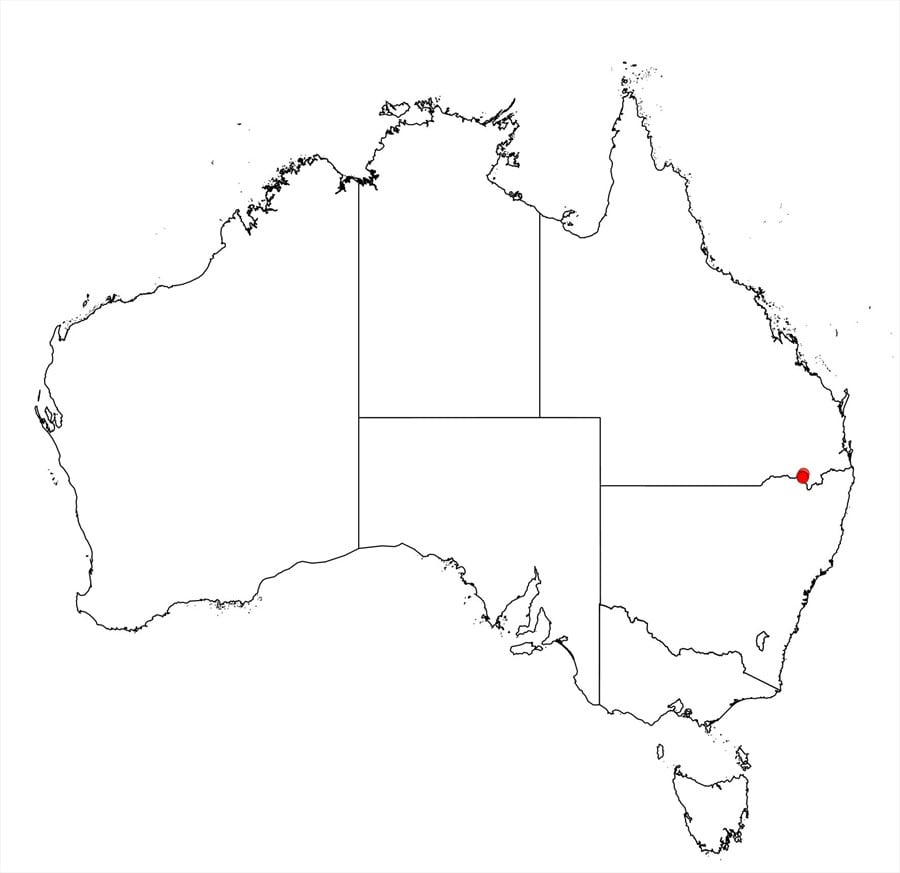Acacia argyrotricha Pedley
WATTLE
Acacias of Australia
Family
Fabaceae
Distribution
Known only from the type locality in Qld.
Description
Spreading shrub 1–2 m high. Branchlets angular, with dense, appressed, straight, long, white hairs (brownish on new shoots). Phyllodes linear, flattened, shallowly incurved, thick, 10–15 cm long, 1–1.8 mm wide, short-acuminate by a shallowly curved, somewhat brittle, ±pungent, dark brown point, with indumentum of appressed hairs when young, glabrescent or hairs retained at base and in patches or along midline, multistriate, with nerves not anastomosing; gland basal; pulvinus stout, c. 1 mm long. Heads in pairs on a short axillary axis, 30–40-flowered, deep yellow; peduncles 1–2.5 mm long, often obscured by anthers so heads appear sessile, densely pubescent; basal bract wide, concave, deciduous, c. 1 mm long. Flowers 5-merous; calyx c. 1 mm long, lobed to about middle, ciliolate; corolla c. 1.5 mm long, c. 1/3-lobed, glabrous; stamens 3–4 mm long; ovary glabrous. Pods linear, straight to shallowly and somewhat irregularly curved, raised over seeds and very shallowly constricted between them, to 7.5 cm long, c. 2.5 mm wide, coriaceous, with patchy indumentum of silvery appressed hairs. Seeds longitudinal, oblong, 3–4 mm long, 1.7–2 mm wide; aril terminal, cupular.
Phenology
Flowers Sept.–Oct.; fruits Dec.
Habitat
It occurs in sandy soil in eucalypt woodland.
Specimens
Qld: Bracker State Forest, S of Inglewood, A.R.Bean 1023 & 2735 (BRI); loc. id., M.E.Ballingall 2683 (BRI, PERTH); loc. id., K.M.Sparshott KMS370 & P.E.Sparshott (BRI, DNA, NSW).
Notes
Acacia argyrotricha resembles the widespread and variable A. rigens but differs notably in the long, appressed hairs of the branchlets and young phyllodes; the indumentum is retained around the pulvinus and often in patches on and along the midline of old phyllodes. In A. rigens the phyllodes are normally terete, its peduncles often longer than those of A. argyrotricha and its pods not as strongly constricted between the seeds.
FOA Reference
Data derived from Flora of Australia Volumes 11A (2001), 11B (2001) and 12 (1998), products of ABRS, ©Commonwealth of Australia
Author
Edited by B.R.Maslin
L.Pedley
This identification key and fact sheets are available as a mobile application:
URL: https://apps.lucidcentral.org/wattle/
© Copyright 2018. All rights reserved.







